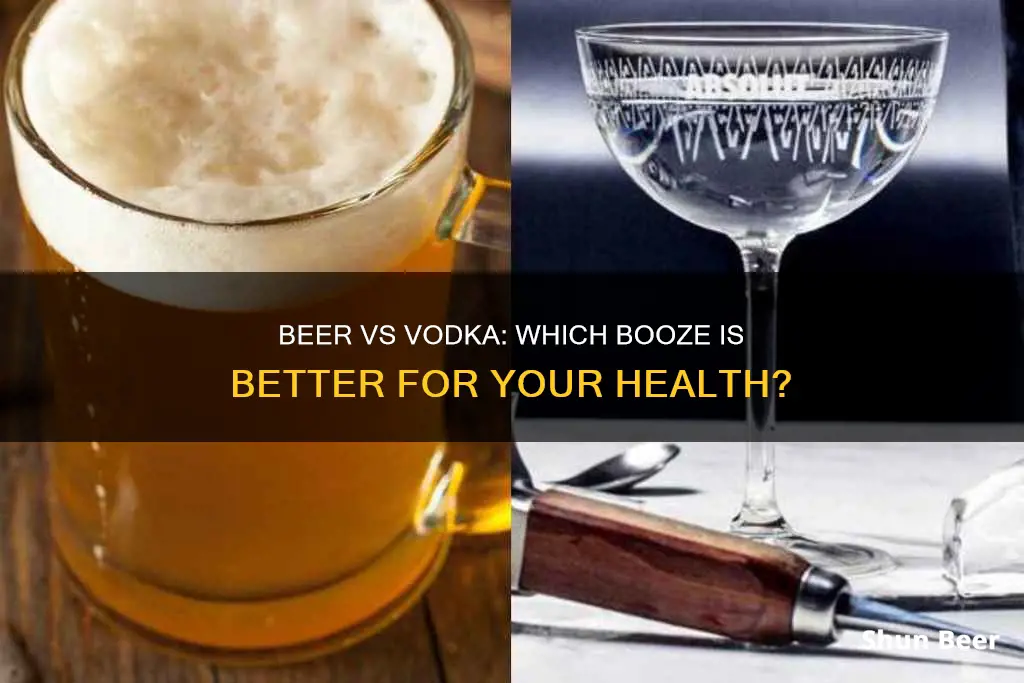
Alcohol is a toxic and addictive substance with no nutritional value that can have adverse effects on your health. However, drinking in moderation can offer some health benefits. Vodka and beer are two popular alcoholic drinks with distinct characteristics and effects on the body. Vodka is a distilled spirit with high alcohol content, while beer is produced through fermentation and has lower alcohol content. So, which is healthier, a beer or a shot of vodka?
| Characteristics | Values |
|---|---|
| Calories | A 1.5-ounce shot of vodka has 85-124 calories depending on the proof. A 12-ounce beer has 96-168 calories. |
| Carbohydrates | Vodka has zero carbohydrates. Beer contains carbohydrates, with light beers having fewer than 100 calories. |
| Additives | Vodka mixed with sugary drinks can increase calorie count. Beer is often drunk without additives. |
| Alcohol by volume (ABV) | A shot of vodka has a higher ABV than a can of beer. |
| Health Benefits | Both beer and vodka have been associated with health benefits when consumed in moderation. |
| Addictiveness | Vodka is more addictive than beer due to its higher alcohol content and ability to be masked with non-alcoholic drinks. |
What You'll Learn

Vodka has fewer calories than beer
When it comes to alcohol, moderation is key. While drinking a couple of beers every day will lead to a beer belly, having one beer two or three nights a week is a much healthier option. Similarly, a shot of vodka occasionally can be a good, low-calorie option, especially if you're on a diet or watching your weight.
Vodka is one of the lowest-calorie alcoholic beverages, with a single shot typically containing less than 100 calories. The exact number of calories depends on the proof of the vodka, which refers to the percentage of alcohol in the liquor. For instance, a 1.5-ounce shot of 70-proof vodka has 85 calories, while a 100-proof shot has 124 calories. The higher the proof, the more calories it contains.
In contrast, beer is a little more complicated when it comes to nutritional information. All light beers have under 100 calories, but regular and specialty beers can vary significantly. Darker beers tend to be heavier and contain more calories, although this is not always the case. For example, a 12-ounce Miller Lite beer contains 96 calories, while a 12-ounce Blue Moon contains 168 calories.
Therefore, if you're looking for a lower-calorie option, vodka is generally a better choice than beer. However, it's important to remember that alcohol, including vodka, interferes with the body's fat-burning process. Additionally, drinking in moderation is crucial, as excessive alcohol consumption can lead to detrimental health effects and increase the risk of certain types of cancers.
Peanut Butter Beer: Healthy or Unhealthy Indulgence?
You may want to see also

Beer has more antioxidants than vodka
Beer is one of the most consumed drinks worldwide, containing a variety of compounds that offer both appreciated sensorial characteristics and health advantages. The important healthy compounds in beer are those with antioxidant properties that attenuate the content of free radicals produced as by-products in human metabolism, exerting an appreciable effect against cancers or cardiovascular diseases.
The phenolic compounds in beer are derived from two ingredients used in brewing: malt and hops. The antioxidant capacity of beer depends on the antioxidant contents in these two ingredients and on different parameters involved in brewing, namely the variety of barley, the malting process, temperature and pH during mashing, sparging, boiling, the variety of hops used, and yeast fermentation.
Around 70-80% of the phenolic compounds present in beer are derived from malt, while the remaining 30-20% come from hops. Moreover, malt can contribute to around 95% and 86% of the antioxidant capacity of dark and pale beers, respectively.
The main antioxidant compounds in beer are phenolic compounds and melanoidins (formed throughout the Maillard reaction). In addition, some antioxidant additives used in beer (i.e., vitamin C) may also contribute to its antioxidant capacity.
The content of phenolic compounds and melanoidins in beer is influenced by the genetic factor of its raw materials and the environmental conditions in which they grow, as well as technological brewing factors.
Beer antioxidants mainly help to improve certain diseases, for example, moderate beer consumption is associated with an increase in bone density, cardiovascular and immunological benefits, and is also associated with anti-inflammatory and antioxidant properties.
Happy Dads, Healthy Beer: A Cheerful Toast
You may want to see also

Vodka has no nutritional value
Vodka is a distilled spirit, colourless and made from ethanol and water. It is derived from fermented grains, like rye or wheat, or potatoes, and even grapes. Vodka has no nutritional value, containing no sugar, protein, fat, vitamins, minerals, antioxidants, or cholesterol. The calories in vodka come from the alcohol itself, with a higher alcohol content resulting in more calories. For example, a 1.5-ounce shot of 70-proof vodka has 85 calories, while a 100-proof vodka has 124 calories.
Vodka is often chosen by those on a diet or watching their weight as it is one of the lowest-calorie alcoholic drinks. It is also gluten-free and contains zero carbohydrates, making it a good option for those on a low-carb diet. However, it is important to note that the mixers commonly paired with vodka, such as fruit juices or sodas, are high in sugar and can add extra calories.
Compared to beer, vodka typically has fewer calories and no carbohydrates. Beer contains varying amounts of calories and nutritional information depending on the type, with darker beers generally containing more calories. However, light beers usually have under 100 calories.
While vodka may be a better option for those conscious of their calorie or carbohydrate intake, it is important to remember that alcohol, in general, has little to no nutritional value. Additionally, excessive alcohol consumption can be detrimental to one's health and can increase the risk of certain types of cancers. Therefore, moderation is key when it comes to drinking alcohol.
Strong Beer: Healthy or Harmful?
You may want to see also

Beer has more carbohydrates
On the other hand, beer is more complex when it comes to nutritional information. All light beers have under 100 calories, but regular and specialty beers vary. Generally, darker beers are heavier and contain more calories, while light-coloured beers are lighter and lower in calories. However, there are exceptions to this rule, as some brands of light beers can be low or high in calories.
The number of calories in beer can also depend on the serving size. For example, a tall beer will have double the calories of a regular-sized beer. Additionally, craft beers tend to have more calories than mainstream brands. As such, it is important to be mindful of the calorie and carbohydrate content of beer, especially when consuming multiple drinks.
While both beer and vodka have their own sets of characteristics, it is essential to remember that excessive alcohol consumption can be detrimental to one's health. Moderation is key when it comes to reaping any potential health benefits from alcoholic beverages.
Beer for Dogs: Healthy or Harmful?
You may want to see also

Both can be unhealthy in excess
While drinking in moderation can have some health benefits, it's important to remember that excessive alcohol consumption can be detrimental to your health, regardless of whether you're drinking beer or hard liquor. Here's why:
Alcohol is a toxic and addictive substance that can negatively impact your health in several ways. Excessive drinking can lead to liver damage, as liver cells die every time you consume alcohol. This can result in permanent alcohol-related liver disease, where the liver is unable to function properly. Additionally, alcohol interferes with your body's fat-burning process, as your liver prioritises breaking down alcohol over metabolising fats. This "fat-sparing" effect can hinder weight loss efforts.
Excessive alcohol consumption is also associated with an increased risk of various cancers, including breast cancer and cancers of the liver, oesophagus, colon, rectum, and larynx. It is also advised that those who are pregnant or trying to become pregnant, have a weak heart, a family history of alcoholism, liver or pancreatic disease, or have had a stroke, should avoid alcohol altogether.
When comparing beer to a shot of vodka, it's important to consider their respective alcohol contents. Hard liquor, including vodka, has a higher alcohol content than beer, which can make it easier to consume more than intended. A single shot of vodka typically contains less than 100 calories, while a 12-ounce beer contains around 96-168 calories, depending on the brand. However, both beer and hard liquor contain ethanol, which is responsible for most of the health benefits associated with moderate alcohol consumption.
While moderate drinking may offer some health benefits, it's crucial to remember that these benefits diminish rapidly after consuming more than one serving. Therefore, whether you choose to drink beer or vodka, moderation is key to maintaining your health and avoiding the negative consequences of excessive alcohol consumption.
Beer in Moderation: Healthy Habit or Health Risk?
You may want to see also
Frequently asked questions
Vodka is considered a lower-calorie option compared to beer. A single shot of vodka typically has less than 100 calories, while a 12-ounce beer can contain anywhere from 96 to 168 calories or more.
Vodka, being distilled liquor, has zero carbohydrates. Beer, on the other hand, often contains carbohydrates, with regular beers having higher carb counts than light beers.
While no alcohol is considered truly 'healthy', moderate consumption of beer or vodka may offer some health benefits. Beer contains antioxidants, while a study on pigs suggested that vodka can increase capillary density, improving oxygen delivery to blood and tissues.
Excessive alcohol consumption, regardless of the type, is associated with negative health effects. Alcohol interferes with fat burning, increases cravings for high-fat and high-carb foods, and can cause liver damage over time.







